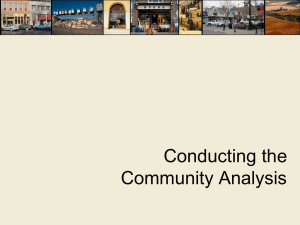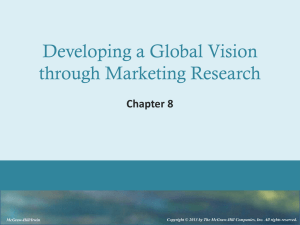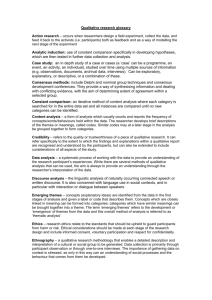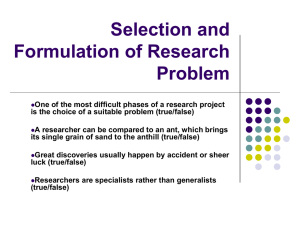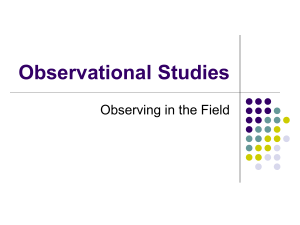Developing Reflexivity in Research
advertisement
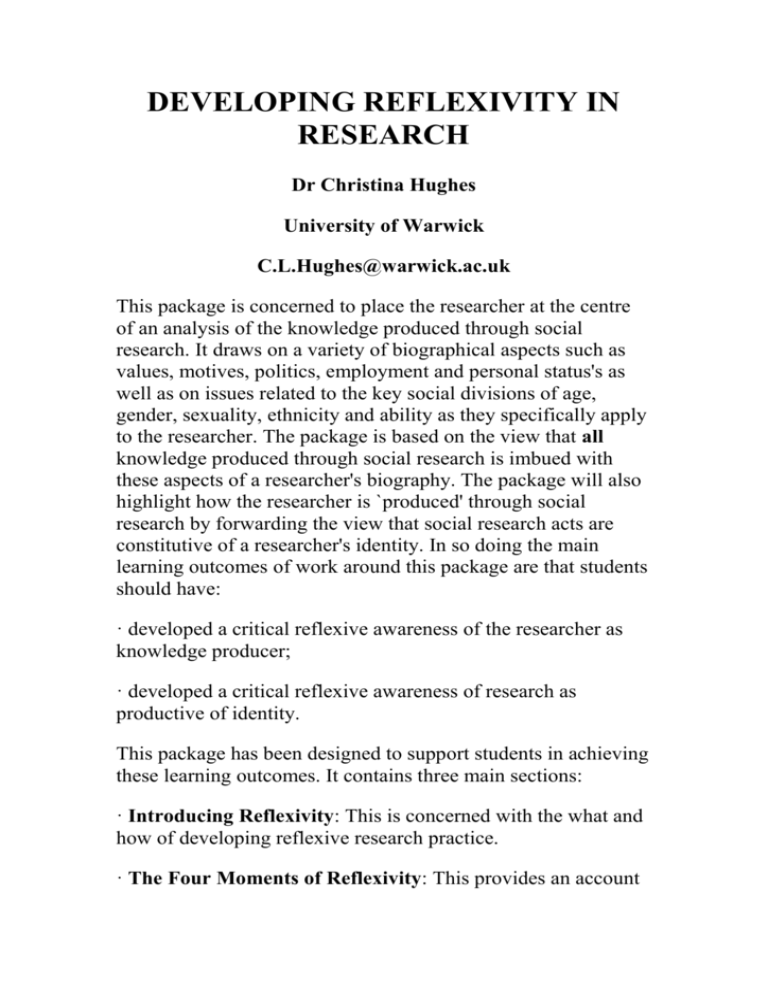
DEVELOPING REFLEXIVITY IN RESEARCH Dr Christina Hughes University of Warwick C.L.Hughes@warwick.ac.uk This package is concerned to place the researcher at the centre of an analysis of the knowledge produced through social research. It draws on a variety of biographical aspects such as values, motives, politics, employment and personal status's as well as on issues related to the key social divisions of age, gender, sexuality, ethnicity and ability as they specifically apply to the researcher. The package is based on the view that all knowledge produced through social research is imbued with these aspects of a researcher's biography. The package will also highlight how the researcher is `produced' through social research by forwarding the view that social research acts are constitutive of a researcher's identity. In so doing the main learning outcomes of work around this package are that students should have: · developed a critical reflexive awareness of the researcher as knowledge producer; · developed a critical reflexive awareness of research as productive of identity. This package has been designed to support students in achieving these learning outcomes. It contains three main sections: · Introducing Reflexivity: This is concerned with the what and how of developing reflexive research practice. · The Four Moments of Reflexivity: This provides an account of the development of reflexivity in qualitative research. The four moments I have identified are: stranger/friend, confessional accounts, critical reflections, the researcher as self. · Researching or Creating Identities: This section is sub-titled the postmodern impetus. This is because researchers are now concerned with (a) the relationship between research and fiction through the characterisation and narrative structures used in the written account; and (b) the production of the researcher's identity. A reference list at the end provides sources that extend and amplify these notes. Part One: Introducing Reflexivity The term reflexivity covers several fields of knowledge: · adult learning; · workbased practice; · qualitative research. · Adult Learning • Mezirow's Seven Different Levels of Reflection (Jarvis, 1995: 96) 1. Reflectivity: awareness of specific perception, meaning, behaviour 2. Affective reflectivity: awareness of how the individual feels about what is being perceived, thought or acted upon 3. Discriminant reflectivity: Assessing the efficacy of perception, etc 4. Judgemental reflectivity: Making and becoming aware of the value of judgements made 5. Conceptual reflectivity: assessing the extent to which the concepts employed are adequate for the judgement 6. Psychic reflectivity: recognition of the habit of making percipient judgements on the basis of limited information 7. Theoretical reflectivity; awareness of why one set of persepctives is more or less adequate to explain personal experience. · Workbased Practice • Argyris and Schon's Reflective Practitioner The key to practitioner success is "developing one's own continuing theory of practice under real-time conditions' (Argyris and Schon, 1974: 157). This requires `the practitioner to be able to reflect on his or her own microtheories of action (that is, contextually specific ideas about what works in the real world) and to relate these microtheries to institutional norms and to client expectations' (Brookfield, 1986: 245). The process of reflection-in-action is essentially artistic, that is, the practitioner makes judgments and exercises skills for which no explicit rationale has been articulated but in which she nevertheless feels an intuitive sense of confidence' (Brookfield, 1986: 247). Reflection in Action: Schon's The Sequence of Moments (Reeves, 1994: 105) · Routine Response · Surprise · Reflection · Question Assumptions · On the spot experiment Awareness in Action (Reeves, 1994: 107) Learning-in-action demands heightened self-awareness. As well as reflecting on events - before, during and after, you need to be aware of your `surreptitious agenda'. By this is meant those inner, not always conscious, forces that cause us to handle situations in ways that accord more with the needs of our ego than the needs of the circumstances. The kind of factors that might come into play - needs, preferences, perceptions, emotions - ... divert us from being as effective as we might have been. ... It is not always easy to be fully conscious of all the nuances of our motives. Nevertheless, some self-reflection, coupled with awareness of the more common forms of distorted managerial behaviour, can be a first step to bringing our surreptitious agenda under conscious control. Many of the things that we learn from experience are practical skills, clearly observable behaviours, which can be practised and on which a judgement can be made about how well one has performed. Inner competence is less tangible. For example, while exerting power is something you do, you cannot always be certain when or whether you are being powerful. In the final analysis you may only be able to judge whether you have been powerful by the results you get. Awareness of self thus has to be linked to the purpose and task in hand. Do not forget the value of retrospective reflection - mulling over, thinking back, evaluating, recapturing experiences. · Qualitative Research • Doing qualitative research is by nature a reflective and recursive process. (Ely et al, 1991: 179) Reflexivity in research is built on an acknowledgement of the ideological and historical power dominant forms of inquiry exert over the researcher and the researched. Self-reflection upon the constraining conditions is the key to the empowerment `capacities' of research and the fulfilment of its agenda. ... As we see it, the process of reflexivity is an attempt to identify, do something about, and acknowledge the limitations of the research: its location, its subjects, its process, its theoretical context, its data, its analysis, and how accounts recognize that the construction of knowledge takes place in the world and not apart from it. ... For us, being reflexive in doing research is part of being honest and ethically mature in research practice that requires researchers to `stop being "shamans" of objectivity' (Ruby, 1980: 154). To not acknowledge the interests implicit in a critical agenda for the research, or to assume value-free positions of neutrality, is to assume `an obscene and dishonest position' (ibid). (Shacklock and Smyth, 1998: 6,7) Processes of Reflection Experiences Reflexive Processes Outcomes • Behaviour Returning to Experience New Perspectives • Ideas Attending to Feelings on Experience • Feelings Re-evaluating Experience Change in Behaviour • Readiness for Action • Commitment to Action Undertaking Reflexive Practice in Research · The Research Diary: A Place for Recording Reflections Keeping a research diary is an essential part of undertaking qualitative research. It is useful to separate this into four sections in order that you are prompted to reflect on different aspects of doing research and your role within the construction of research knowledge (Blaxter, Hughes and Tight, 2001): • · Observational Note • This is a descriptive note of an event such as an interview, chance encounter, observation. They contain as little interpretation as possible and are as reliable as you can construct them. · Methodological Note • This is the place where you reflect on the methodological aspects of research and your actions in undertaking an interview, observation and so forth. How did the interview go? What was your role within it? · Theoretical Note • It is here that you begin to make meaning about your data. What are your initial explanations? What is your data telling you? · Analytic Memo • This is the place where you are trying to bring several inferences together. You might, for example, review your theoretical notes and begin to see patterns or recurrent themes in your data. You would also attempt to link your analysis to the literature in your field. · Research Issues to Reflect On 1. The wider relevance of the setting and the topic, and the grounds on which empirical generalizations are made, if any, such as establishing the representativeness of the setting, its general features or its function as a special case study with a broader bearing. 2. The features of the topic or setting left unresearched, discussing why these choices have been made and what implications follow from these decisions for the research findigns. 3. The theoretical framework they are operating within, and the broader values and commitments (political, religious, theoretical and so on) they bring to their work. 4. Critically assess their integrity as researchers and authors, by considering: • · The grounds on which knowledge claims are being justified (length of fieldwork, the special access negotiated, discussing the extent of the trust and rapport developed with the respondents and so on) · Their background and experiences in the setting and topic · Their experiences during all stages of the research, especially mentioning the constraints imposed therein. · The strengths and weaknesses of their research design and strategy. 5. Critically assess the data, by: • · Discussing the problems that arose during all stages of the research; · Outlining the grounds on which they developed the categorization system used to interpret the data, identifying clearly whether this is an indigenous one used by respondents themselves, or an analyst-constructed one, and, if the latter, the grounds which support this; · Discussing rival explanations and alternative ways of organizing the data; · Providing sufficient data extracts in the text to allow readers to evaluate the inferences drawn from them and the interpretations made of them; · Discussing power relations within the research, between researcher(s) and subjects and within the research team, in order to establish the effects of class, gender, race and religion on the practice and writing up of the research. 6. Show the complexity of the data, avoiding the suggestion that there is a simple fit between the social world under scrutiny and the ethnographic representation of it, by: • · Discussing negative cases which fall outside the general patterns and categories employed to structure the ethnographic description, which often serve to exemplify and support positive cases; · Showing the multiple and often contradictory descriptions proffered by the respondents themselves; · Stressing the contextual nature of respondents' accounts and descriptions, and identifying the features which help to structure them. (Brewer, 2000: 132-133) Part Two: The Four Moments of Reflexivity There are a variety of sources that underpin the philosophical debates that are concerned with how the researcher's biography is implicated in the production of knowledge. These are related to issues of objectivity and subjectivity, social reality and identity. With its emphasis on the importance of participant observation and immersion in the field of study, social anthropologists have long since debated ideas of researcher objectivity. For example, the diaries kept by the anthropologist Malinowski on his fieldwork experiences in the Trobriand Islands illuminate aspects of White western and male imperialism (see Burgess 1982 for an example). Wax (1971) illuminates issues of objectivity and subjectivity in her analysis of the `stranger' and `friend' aspects of fieldwork roles in her studies of Japanese American relocation centres during World War 2 and American Indian communities during the 1950s. The development of what are broadly called qualitative methodologies builds on the social anthropological tradition (through for example the work of the Chicago School in the decades between the two world wars (for a review of the Chicago School see Hammersley, 1989, Chapter Three)). Its impact in educational research can be seen particularly through the work of Burgess (1984). Burgess developed the theme of `confessional accounts' where sociologists gave `warts and all' views of their social research experiences. One of the purposes of these was to explore other realities of social research than are given in classic methodological cook-books. Contributors to Burgess' text therefore illustrated how age and experience influenced the conduct of the study, how a wish `to change the world' prompted engagement in social research and how gossip is integral to academic research work. Hughes (1992) is an example of the `confessional account' is respect of participant observation in the stepfamily. Alongside the work of Burgess in the field of education, secondwave feminists more generally were developing sophisticated critiques of the `malestream' nature of social research. Oakley (1981) provides what has become a classic critique of the objectivity of the research interview. Her analysis highlights how traditional approaches to research interviewing, where the interviewer maintains detachment and distance, is not only bad practice but is also antithetical to a feminist research philosophy that seeks to validate the subjective experiences of women. As feminism has developed along the lines of difference (`race', sexuality, class, ability), these have been integrated into analyses of the research process. Thus, Maynard and Purvis (1994) provide accounts that explore the intersections of gender and `race', Black female sexuality and feminists researching men. Each of the preceding approaches has been concerned with knowing the social world more effectively. The incorporation of how the researcher is implicit in the production of knowledge is integral to this. More recently postmodernist perspectives have added their weight to these issues through a critique of ideas of realism. The premise of this is that as social beings we are inscribed by aspects of the social world to the extent that much of this is invisible to us. For example, what we `take-forgranted' or view as normal is simply the result of these social inscriptions. (For post-structuralists discourse is a key route by which we become inscripted beings). Reflexivity, for example, is a modernist phenomena that rests on ideas of human agency (to act with `free will') with a goal that we will know ourselves, and the social world, `better'. Postmodernists argue that we can never get outside these inscriptions because, as much as they are part of us, we are also part of them. For example, Scheurich (1997: 160) draws on Foucault to set out an `archealogical' approach to postmodern social research. In this he notes that whilst he may critique the assumptions of realism in all other forms of social research he also knows `that it is possible to get totally outside of realism; it is still too deep, too embedded. Consequently, even my efforts to describe an archaeological position will inevitably be infected with realism'. Through four accounts of the same events Hughes (1999) demonstrates the contingency of reality. In addition she highlights how reflexivity can raise more questions than answers. Take care, however, not to assume that all these critiques imply that objectivity should be a forsaken goal. Or, as is often assumed with postmodernist critiques, that as everything is relative there is no point in striving for a `better' world. Harding (1991) for example both presents a theory of feminist standpoint and argues for `strong objectivity'. Feminist standpoint theory argues that research should focus upon the perspectives of the oppressed in a patriarchal world. This is for two reasons. First, the oppressed stand outside mainstream social relations and therefore can see these realities for what they are. They are, if you like, detached (though not objective) observers. Second, and in consequence, we will be able to produce `better' knowledge for social change. Similarly, Scheurich (1997) takes up a position as a criticalist-oriented postmodernist. Accordingly he is concerned to subvert issues of racism and sexism. In so doing he maps some ideas of what postmodern research would look like in the policy arena and in terms of epistemological racism. Finally, we might invert the idea that the researcher influences the research by exploring how research constitutes the researcher. Coffey (1999) argues that researchers should be aware of how fieldwork research and ethnographic writing construct, reproduce and implicate selves, relationships and personal identities. One way of exploring this is through the concept of career (itself embedded with identity assumptions). Becoming a researcher, for example, means that one takes up a self-concept of oneself as such a person. Fieldwork experiences, similarly, may contribute to one's sense of self or selves. Birch (1998: 183), for example, describes her research experiences very clearly in terms of the creation of the self. Thus, `The more I progressed into the analysis and the writing up, and so into my own personal, private space, the more I became aware of the emergence of my own sociological identity. I was the author who was choosing to make certain arguments and explanations. Hence it is the recognition of the mirror image that was my own inner journey of self-discovery. The more I told my sociological story the more my sense of self as a sociologist was discovered.' Part Three: Researching, or Creating Identities? The Post-Modern Impetus • Based on our review of manuscripts over several years, we see a strong tendency among scholars to reflect on their work and their place in it rather than to do the work ... As a result, and despite the espoused goal of encouraging other voices to be heard, the loudest voice is that of the author. (Hatch and Wisniewski, 1995: 131) The discursive nature of social reality is pretty much an open secret these days. From cartoons and TV ads to political commentaries and sociological treatises, one can spot a kind of `discursive literacy' at work - an understanding of the rhetorical fabric out of which institutions and reputations are built, and a fluency in `reading' mischievous texts (such as `The Simpsons') that mess with time, narrative coherence, moral authority, literary pretension and stable identity. Children are good at it. Attitudes to this fin-de-siecle discursive literacy are deeply ambivalent however. Policy makers both practice it and persecute it - deploying it to sell (`spin') their own policies, while castigating researchers for dealing in rhetoric rather than reality. But educational research generally ignores it or deplores it anyway, sentencing itself to a basic literacy that still thinks `lucid prose' will produce plan truths. (MacLure, 1999: 157) By working the hyphen I mean to suggest that researchers probe how we are in relation with the contexts we study and with our informants, understanding that we are all multiple in those relations. I mean to invite researchers to see how these "relations between" get us "better" data, limit what we feel free to say, expand our minds and constrict our mouths, engage us in intimacy and seduce us into complicity, make us quick to interpret and hesitant to write. Working the hyphen means creating occasions for researchers and informants to discuss what is, and is not, "happening between," within the negotiated relations of whose story is being told, why, to whom, with what interpretation, and whose story is being shadowed, why, for whom, and with what consequence. (Fine, 1998: 135) I can ... offer several arguments, perhaps even a family resemblance of arguments, though some of them are unruly and contradict each other. I could imply, even subtly, that I have gained, risen, improved grown theoretically and personally. I could suggest that I have made sharp, carefully worded, clear arguments, never violating their logical trajectories. However, none of these are suitable. Instead, I have wavered and misstepped; I have gone backward after I have gone forward; I have drifted sideways along a new imaginary, forgetting from where I had once thought I had started. I have fabricated personae and unities, and I have sometimes thought I knew something of which I have written. (Scheurich, 1997: 1) Who I am potentially shifts with each speaking, each moment of being positioned within this or that discourse in this or that way. (Davies, 1992: 57) Scheurich describes the researcher as the imperialist powerbroker who can marshall her or his data in a way to suit and who colonises the researched with their analyses and their power. Yet the research also colonises the researcher in ways that are little explored (but see Coffey, 1999). The interrelationship between researched and researcher, the need to overcome binaried thinking and worry the hyphen (Fine, 1998) are contemporary issues that now face social researchers. Yet, with some similarity to Scheurich, Fine notes that the risk for qualitative researchers is that of `imperial translation' (p 152). This means that social researchers are continually negotiating `how, when, and why to situate and privilege whose voices' (p 152). The issues of voice are bound up with critiques of authorial authority that have arisen through what has been defined as the `linguistic turn' in social science. These debates have highlighted how realities are constructed through language. Most often associated with poststructuralist approaches (see for a discussion Beasley, 1999; Finlayson, 1999) language shapes how we come to know. This is not, however, perceived in an unproblematic way. Rather language conveys a range of meanings that are never fixed nor static. Meanings are not only ambiguously shared in the everyday. Researchers also construct meanings, and identities, in the presentation of their findings. Alongside the `linguistic turn' therefore we also find the `textual turn'. Atkinson (1990) illustrates how the believability of the research report is not a given that just comes with the data. It is formed through the researcher's use of a variety of literary devices and narrative strategies that depict rhetorical figures, use descriptive vocabulary to evoke the scenes within which these characters live their lives and which rely on the selection of appropriate illustrative material. Indeed, no matter how much we may try to avoid these issues, and in so doing reduce our authorial authority, as Richardson (1992: 131) states `No matter how we stage the text, we - the authors - are doing the staging'. There have been five main responses to these issues: · Authors of texts now write themselves into the work through a range of reflexive and autobiographical devices. Yet the balance between omniscient authorial silence and omniscient authorial presence is a difficult one to get right as Hatch and Wisnieski's (op cit) exasperated sigh indicates; · One can take up a political and ethical framework that refuses to occlude the messy power relations that existed between author and authored. At its simplest level this means developing a dialogic relation between researcher and researched from the outset. Such a position goes beyond respondent validation. The aim of respondent validation has more to do with ensuring research respondents guarantee the authenticity of the account. Rather, it suggests a recognition of the multi-layered levels of meaning created through research acts; · A greater consciousness of narrative devices and strategies of persuasion has led to greater risk taking and experimentation in the presentation of research data (see for example Perriton 1999, Richardson, 1990); · A growing recognition that interpretation cannot be controlled. There is no `single, literal reading of a textual object, the one intended by the author' (Barone, 1995: 65). This does not mean that some reading are no longer more privileged than others. They are. However, one of the aims of experimental forms of writing are to create new senses of identity as the text can evoke a range of potential identificatory positions with which the reader can engage. For example, Ellis and Bochner (1996: 30) comment that `using creative genres of writing ... can help mobilize social action or evoke participatory experiences through imagination, performance art, and storytelling'. Similarly, Barone (1995: 69) notes how stories can promote the emancipatory self: `Readers who identify with an oppressed group may achieve a unique outcome through reading about rhetorical figures who are metaphors for themselves. Self-recognition may result in an imaginative naming of one's condition.' There are, of course, no guarantees. Davies' (1993) research on feminist literature in the classroom illustrates how, from childhood, our desires are so powerfully invested with/in the status quo. · A dogged conservatism to a `basic literacy' and the efficacy of `lucid prose' within the wider research community (MacLure, op cit)! References and other useful sources Atkinson, P (1990) The Ethnographic Imagination: Textual Constructions of Reality, London, Routledge Barone, T (1995) Persuasive writings, vigilant readings and reconstructed characters: the paradox of trust in educational storysharing, in J Hatch and R Wisnieski (Eds) Life History and Narrative, London, Falmer, pp 63-74 Beasley, C (1999) What is Feminism? An introduction to feminist theory, London, Sage Birch, M (1998) Re/constructing Research Narratives: Self and Sociological Identity in Alternative Settings, in R Edwards and J Ribbens (Eds) Feminist Dilemmas in Qualitative Research: Public Knowledge and Private Lives, London, Sage, pp 171185 Blaxter, L, Hughes, C and Tight, M (2001) How to Research, Buckingham, Open University Press (Second Edition) Brewer, J (2000) Ethnography, Buckingham, Open University Press Brookfield, S (1986) Understanding and Facilitating Adult Learning, Milton Keynes, Open University Burgess, R (1982) Field Research: A sourcebook and field manual, London, George Allen and Unwin Burgess, R (1984) The Research Process in Educational Settings: Ten Case Studies, Sussex, Falmer Coffey, A (1999) The Ethnographic Self, London, Sage Davies, B (1992) Women's Subjectivity and Feminist Stories, in C Ellis and M Flaherty (Eds) Investigating Subjectivity: Research on lived experience, Newbury Park (Calif), Sage, pp 53-78 Davies, B (1993) Shards of Glass, Sydney, Allen and Unwin Ellis, C and Bochner, A (Eds) (1996) Composing Ethnography: Alternative Forms of Qualitative Writing, Walnut Creek, Altamira Press Ellis, C and Flaherty, M (Eds) Investigating Subjectivity: Research on Lived Experience, Newbury Park (Calif), Sage Ely, M et al (1991) Doing Qualitative Research: Circles within Circles, London, Falmer Fine, M (1998) Working the hyphens: reinventing self and Other in qualitative research, in N Denzin and Y Lincoln (Eds) The Landscape of Qualitative Research: Theories and Issues, Thousand Oaks (Calif), Sage, pp 130-155 Finlayson, A (1999) Language, in F Ashe, A Finlayson, M Lloyd, I MacKenzie, J Martin and S O'Neill (Eds) Contemporary Social and Political Theory: An Introduction, Buckingham, Open University Press, pp 47-68 Hammersley, M (1989) The Dilemma of Qualitative Method, London, Routledge Harding, S (1991) Whose Science? Whose Knowledge? Ithaca, NY, Cornell University Press Hatch, J and Wisniewski, R (1995) Life history and narrative: questions, issues, and exemplary works, in J Hatch and R Wisniewski (Eds) Life History and Narrative, London, Falmer, pp 113-135 Hughes, C (1992) A Stranger in the House: Researching the Stepfamily, in R Burgess (Ed) Studies in Qualitative Methodology: Learning about fieldwork, London, JAI Press, pp 33-62 Hughes, C (1999) Learning to be intellectually insecure: the dis/empowering effects of reflexive practice, International Journal of Social Research Methodology, 1, 4, pp 281-296 Hughes, C (2000) The Woman Manager: How Do We Know Her? Coventry, Department of Continuing Education (unpublished paper) Jarvis, p (1995) Adult and Continuing Education: Theory and Practice, London, Routledge (Second Edition) MacLure, M (1999) Discursive (Il)literacy In Research, Policy and Practice, BERA 1999 Conference Proceedings, Brighton, University of Sussex Maynard, M and Purvis, J (Eds) (1994) Researching Women's Lives from a Feminist Perspective, London, Taylor and Francis Oakley, J (1981) Interviewing Women: A contradiction in terms, in H Roberts (Ed) Doing Feminist Research, London, Routledge and Kegan Paul, pp 30-61 Perriton, L (1999) The Provocative and Evocative Gaze upon Women in Management Development, Gender and Education, 11, 3, pp 295-308 Rath, J (1999) Getting Smarter, Warwick, Department of Continuing Education, unpublished PhD thesis Reeves, T (1994) Managing Effectively: Developing Yourself Through Experience, Oxford, ButterworthHeinemann/Institute of Management Richardson, L (1990) Writing Strategies: Reaching Diverse Audiences, London, Sage Scheurich, J (1997) Research Method in the Postmodern, London, Falmer Shacklock, G and Smyth, J (1998) Being Reflexive in Critical Educational and Social Research, London, Falmer Stronach, I and MacLure, M (1997) Educational Research Undone: The Postmodern Embrace, Buckingham, Open University Press Wax, R (1971) Doing Fieldwork: Warnings and Advice, Chicago, University of Chicago Press
